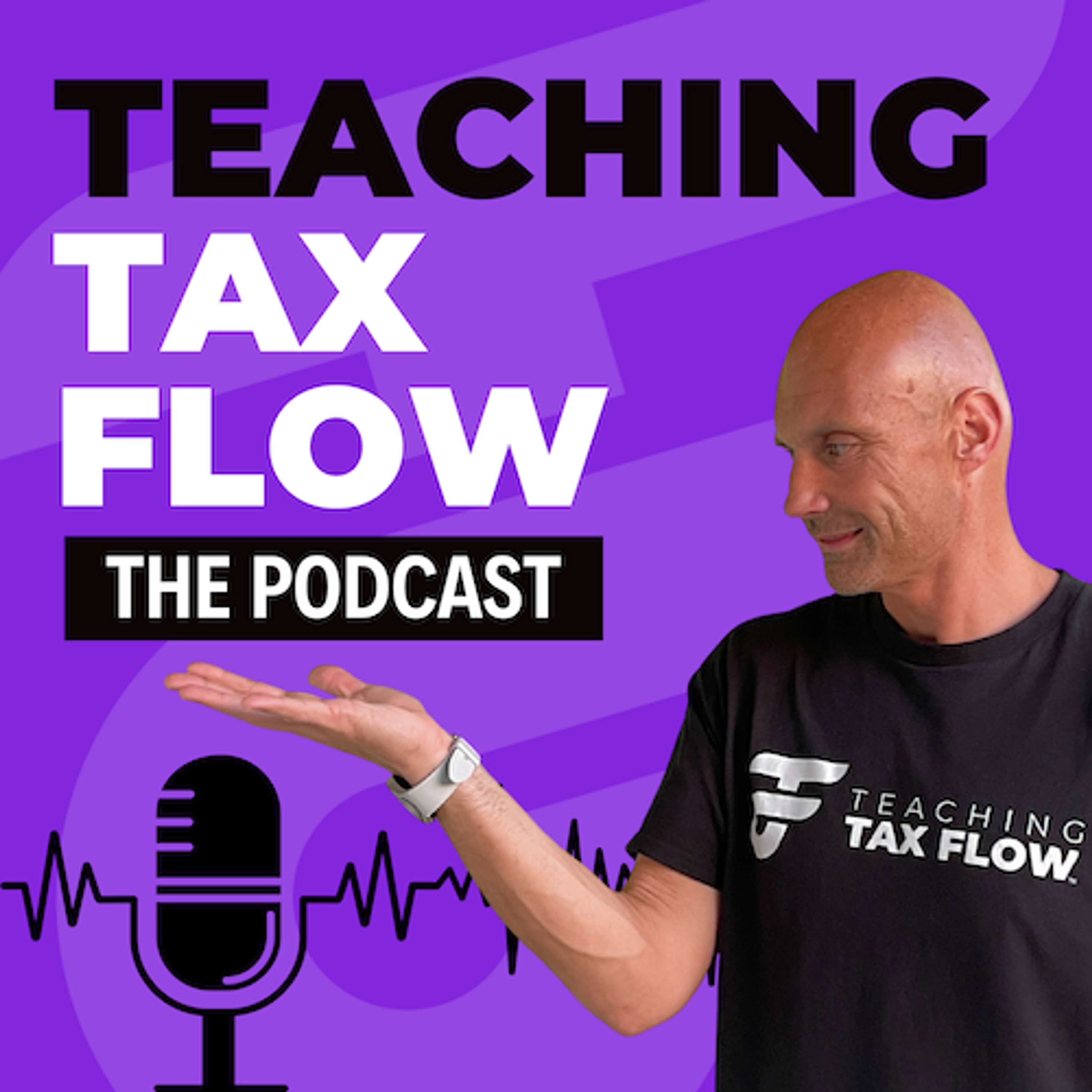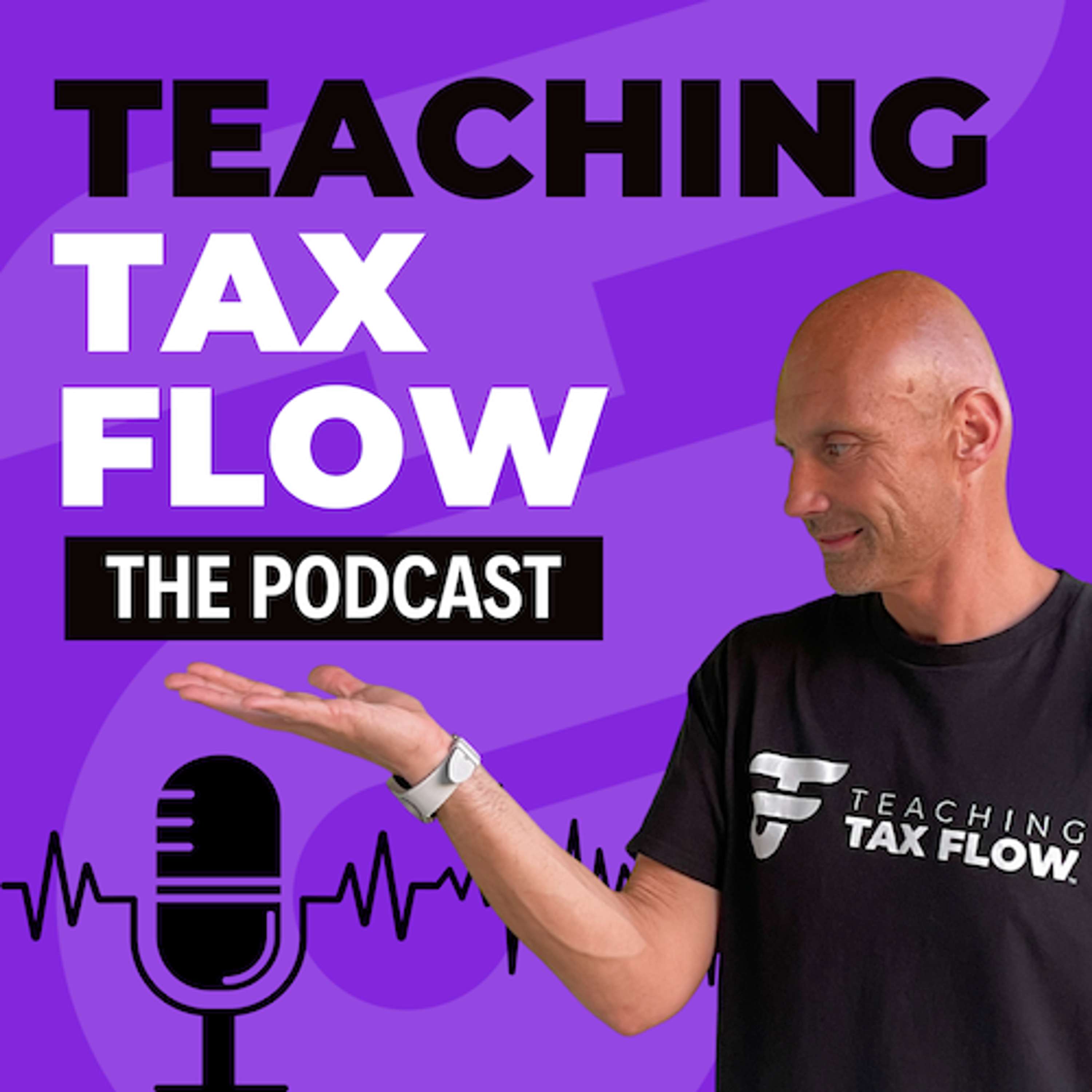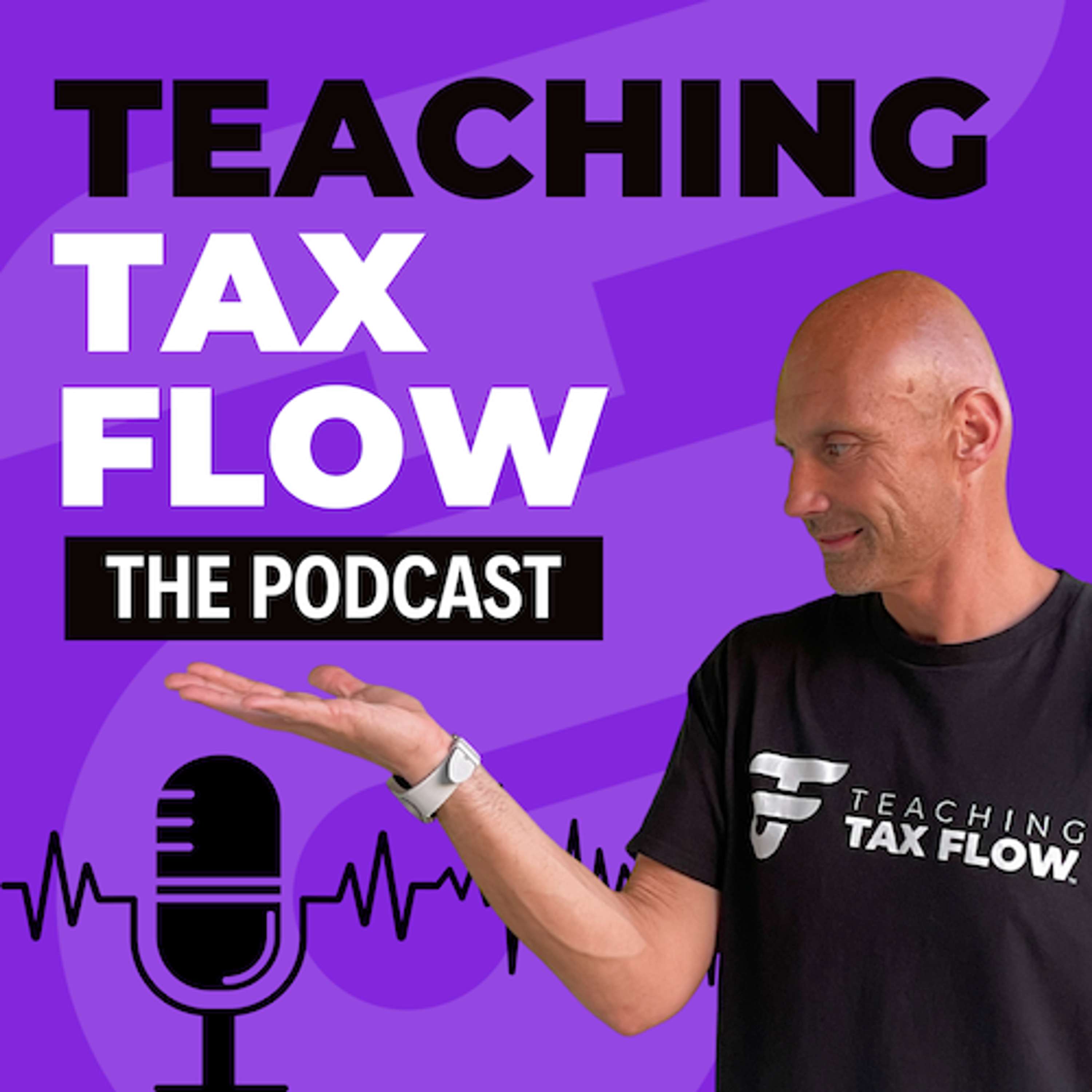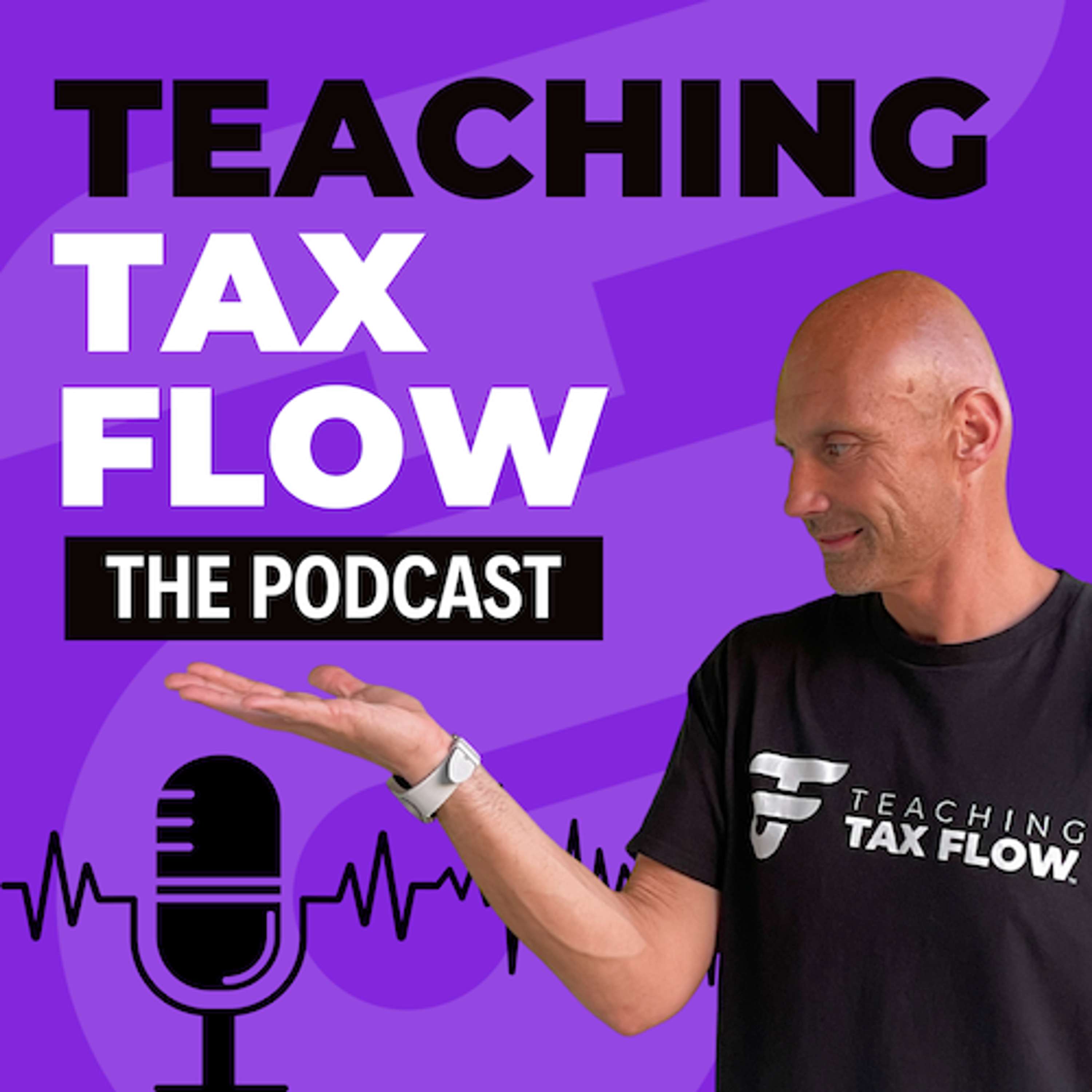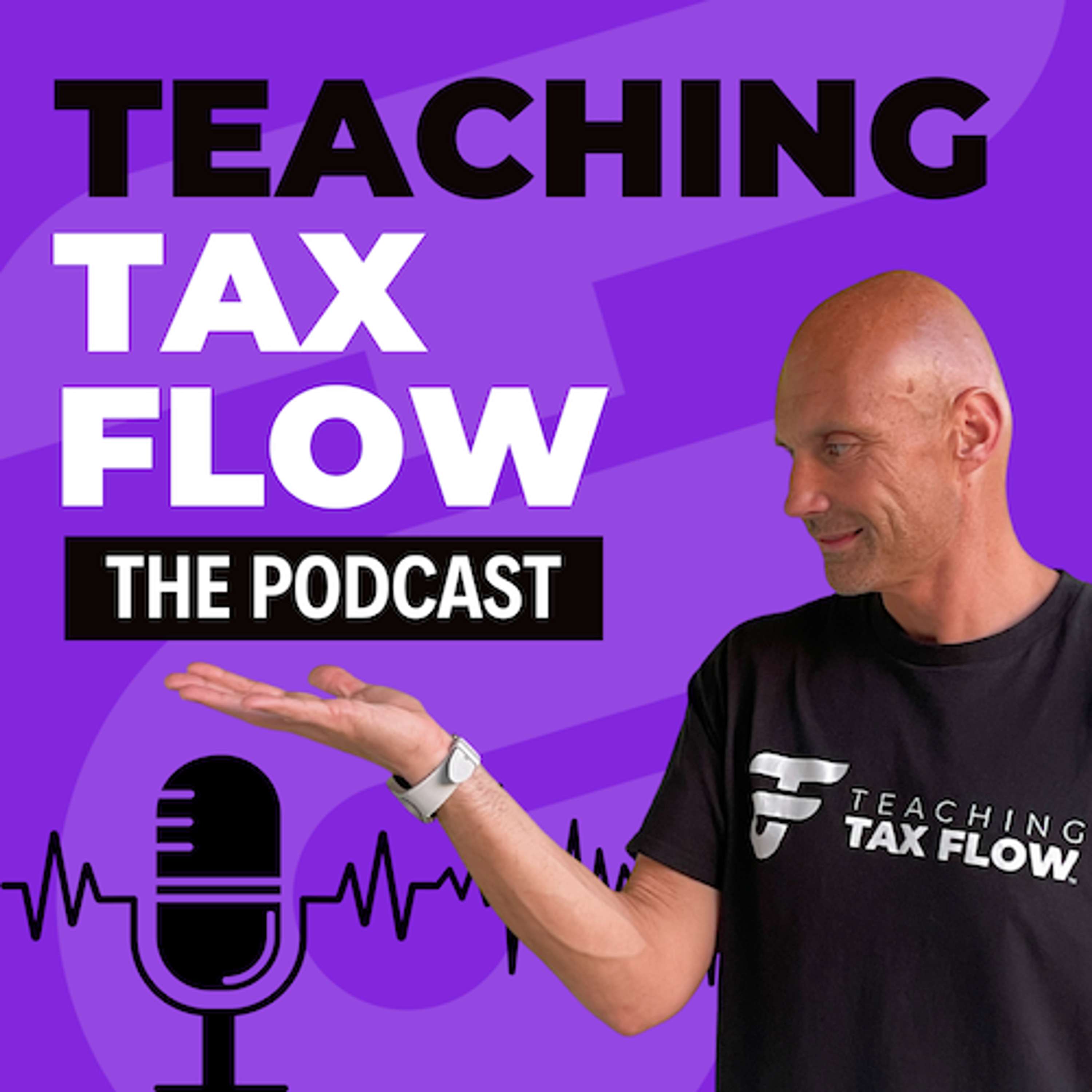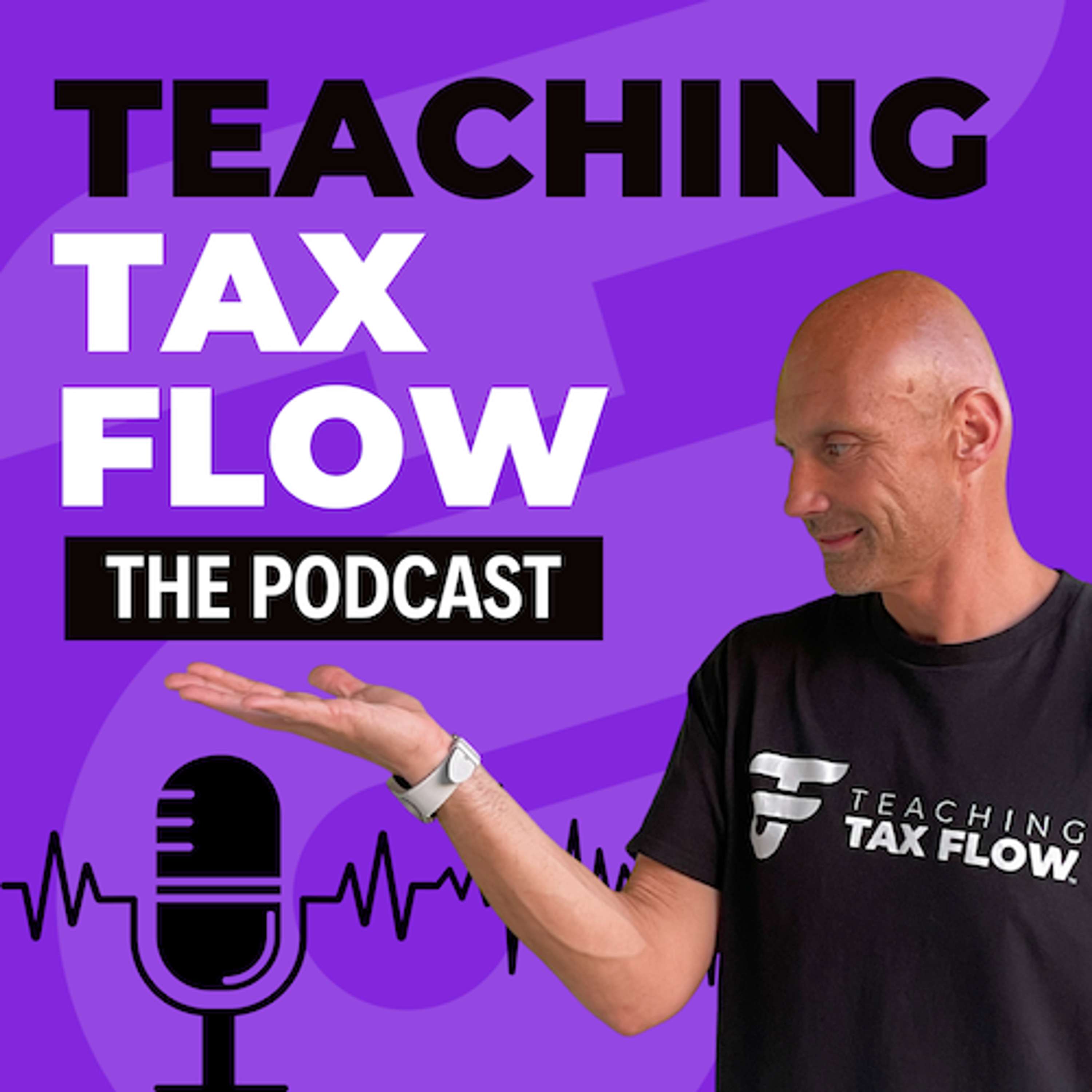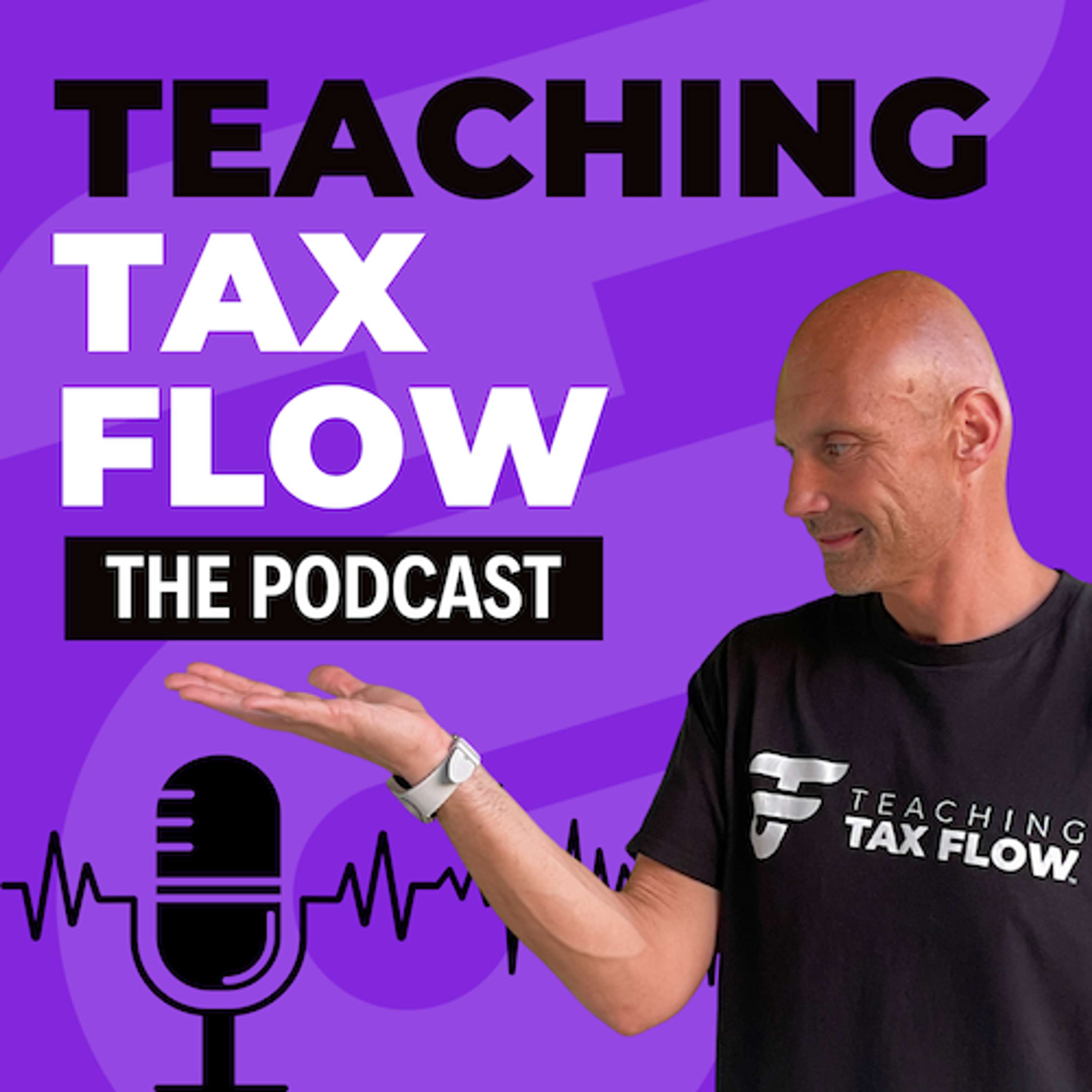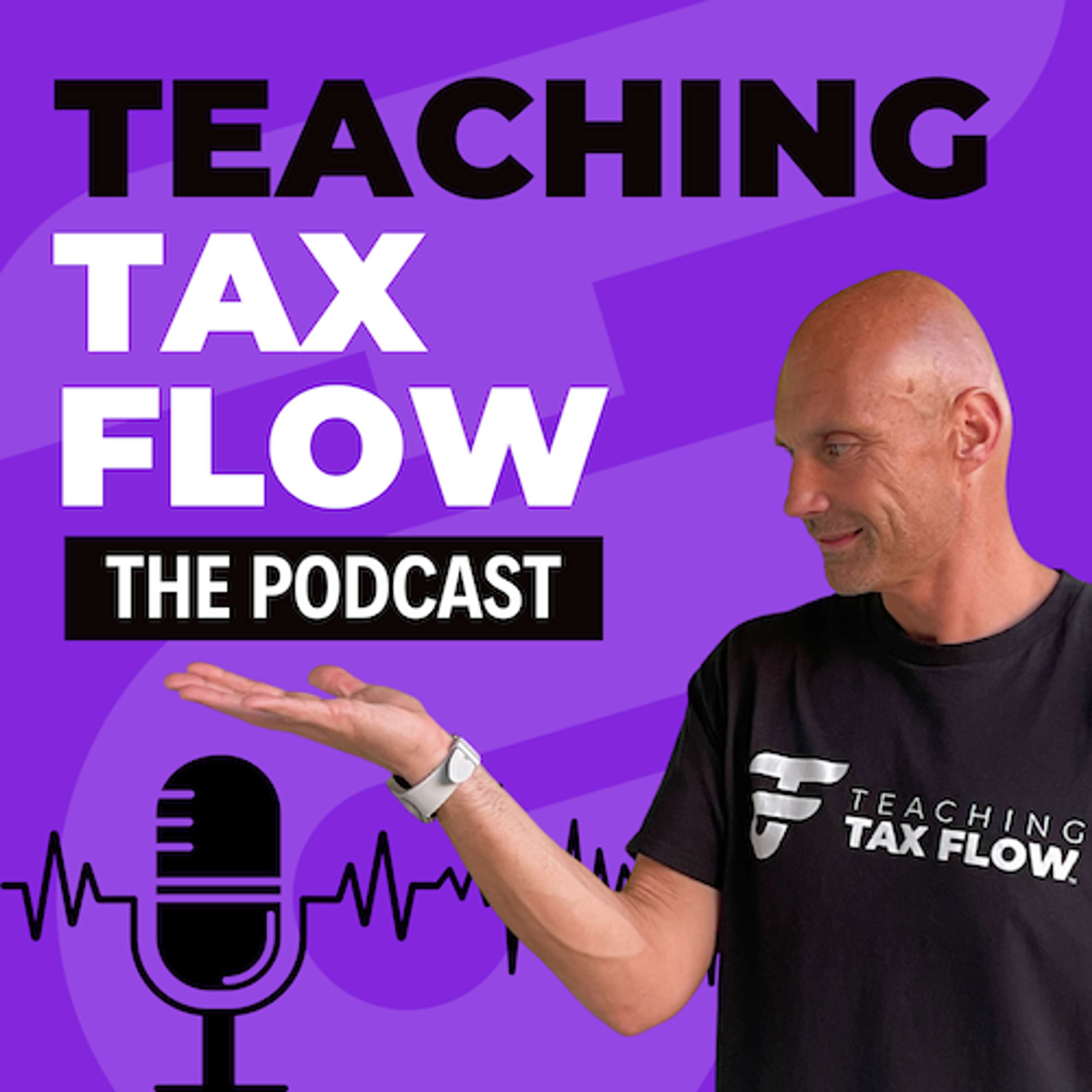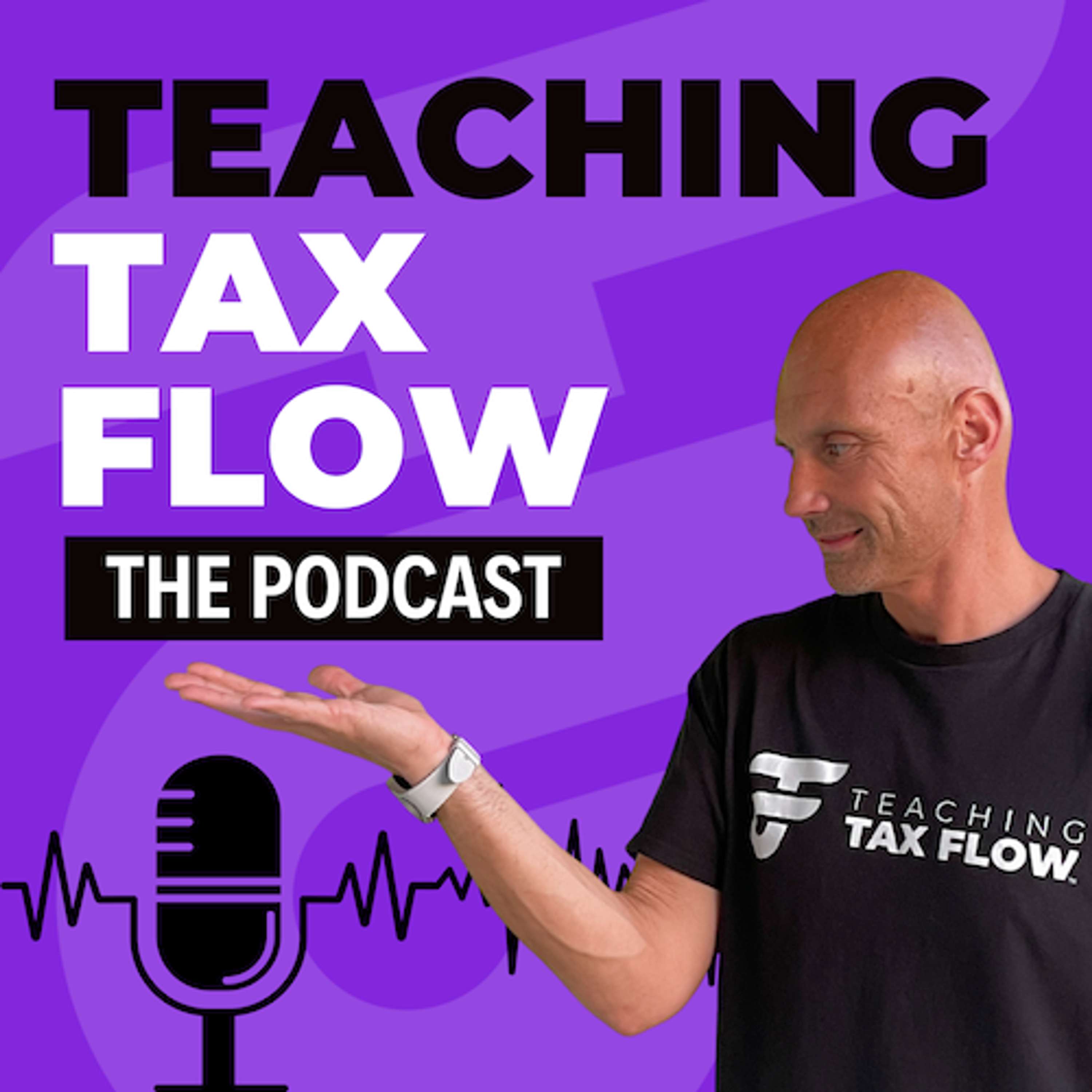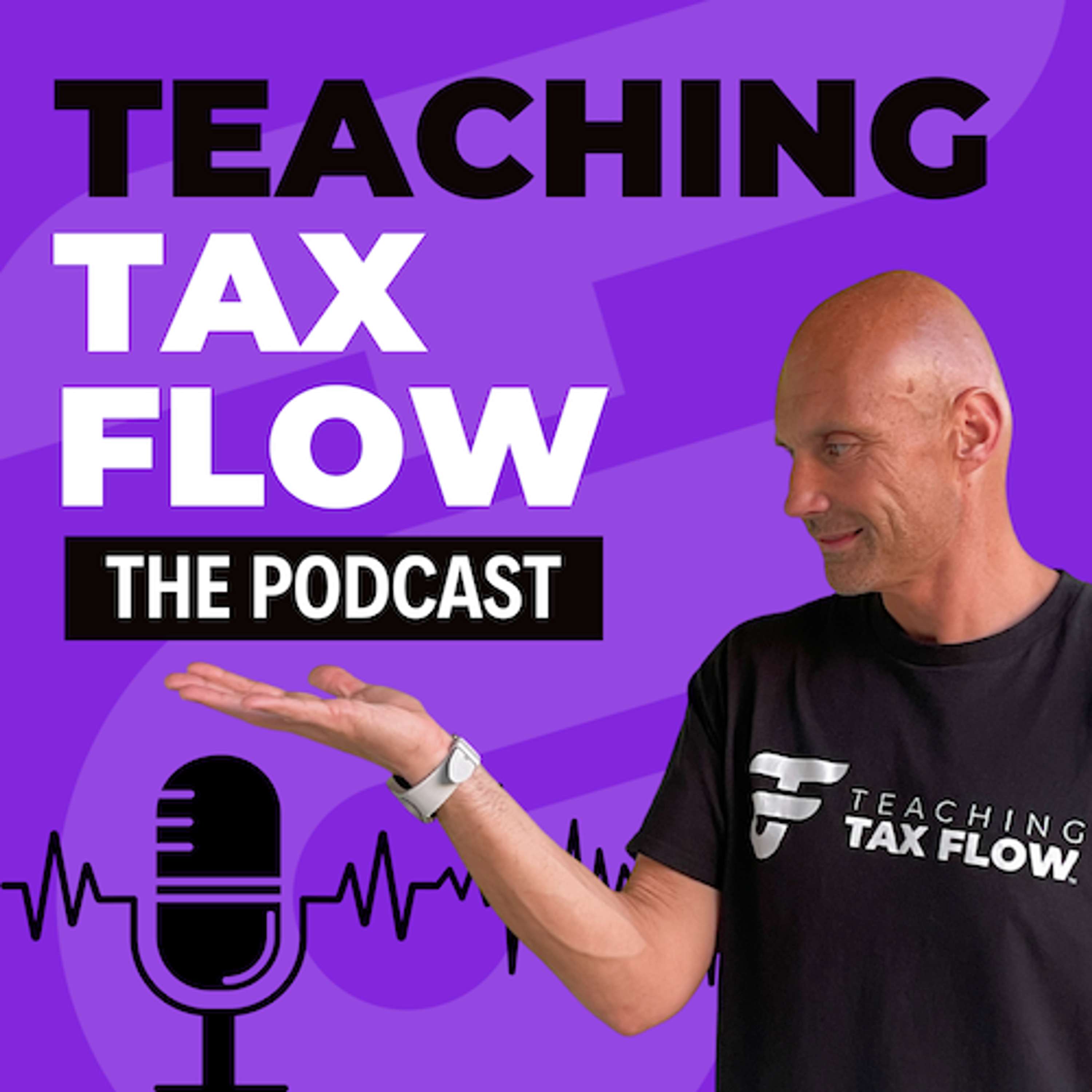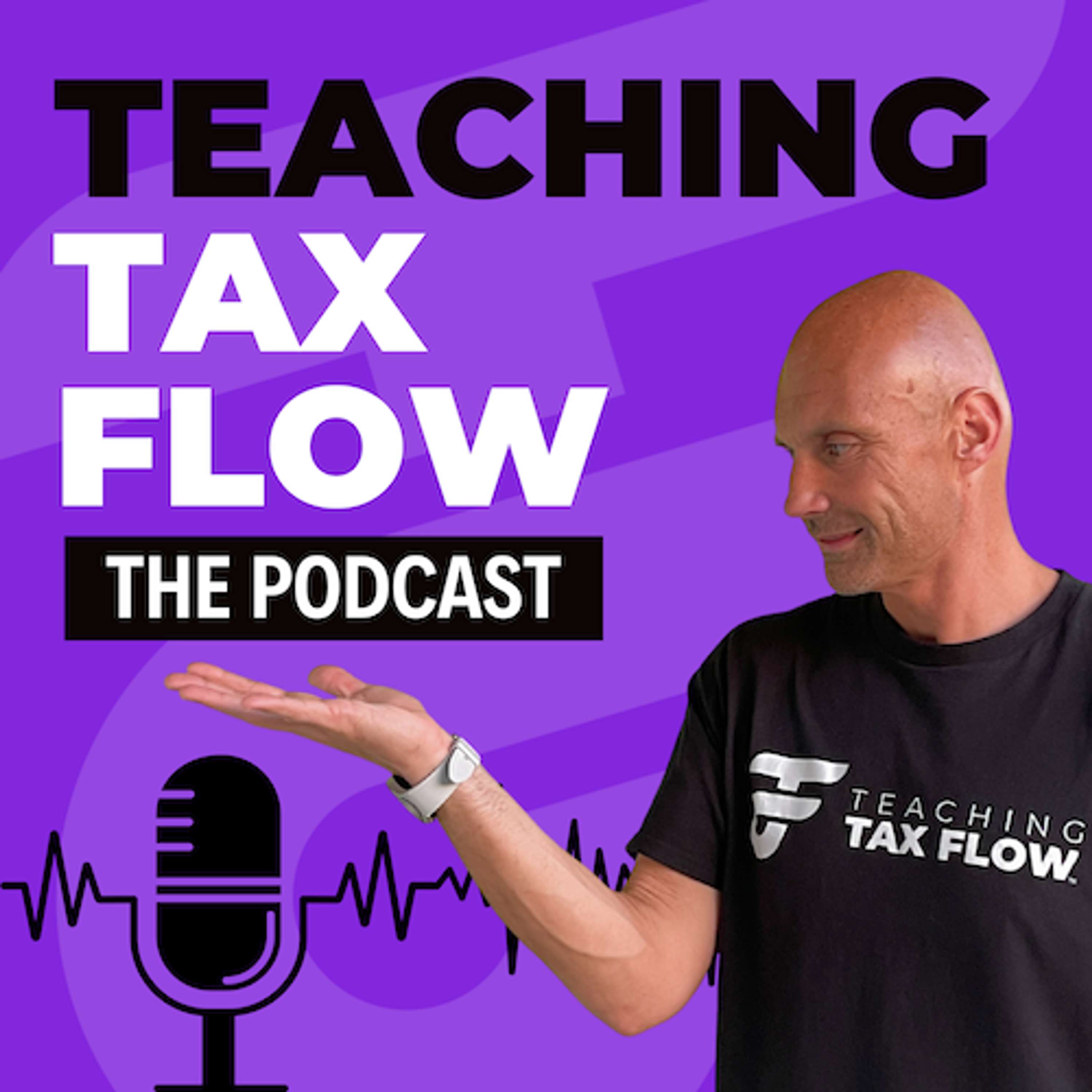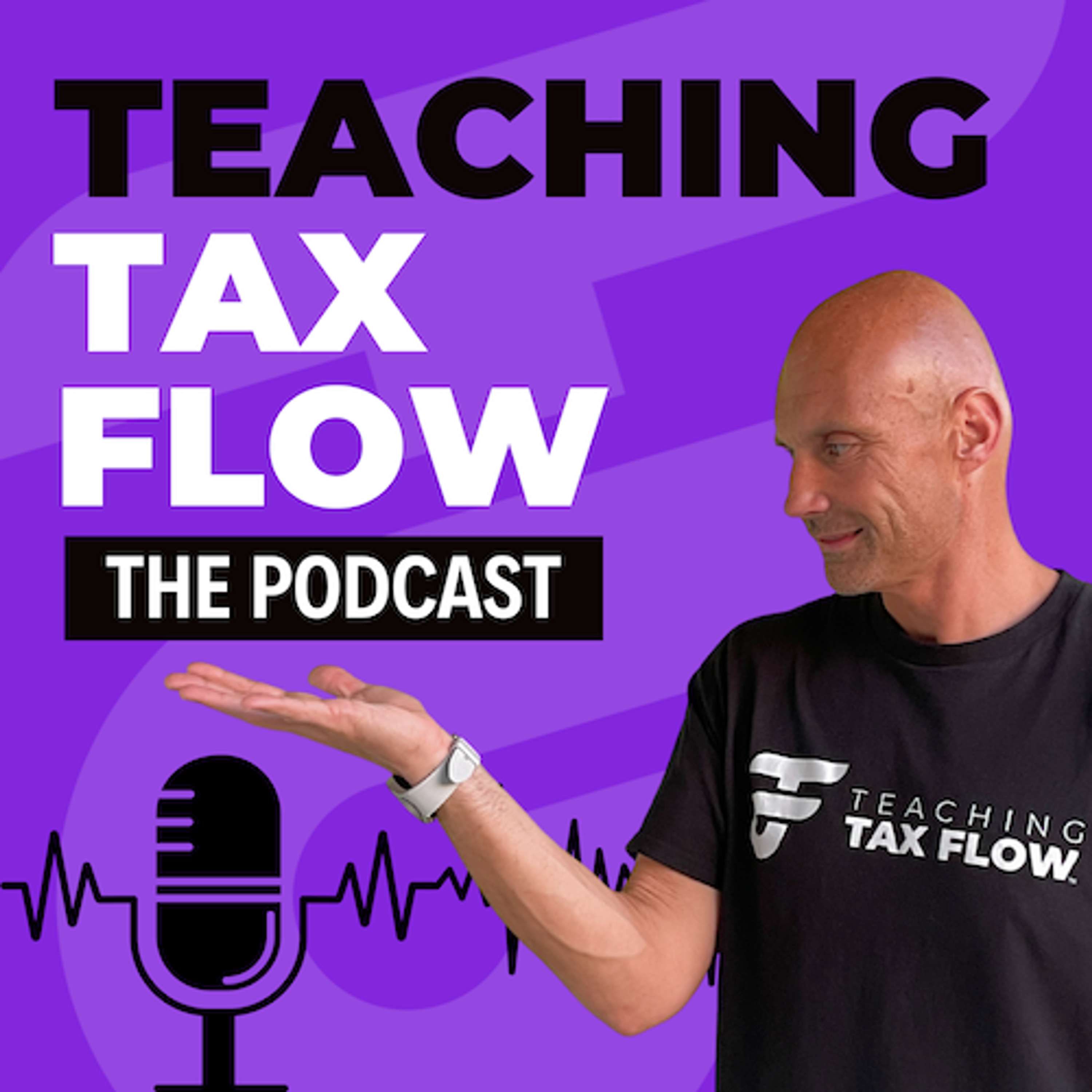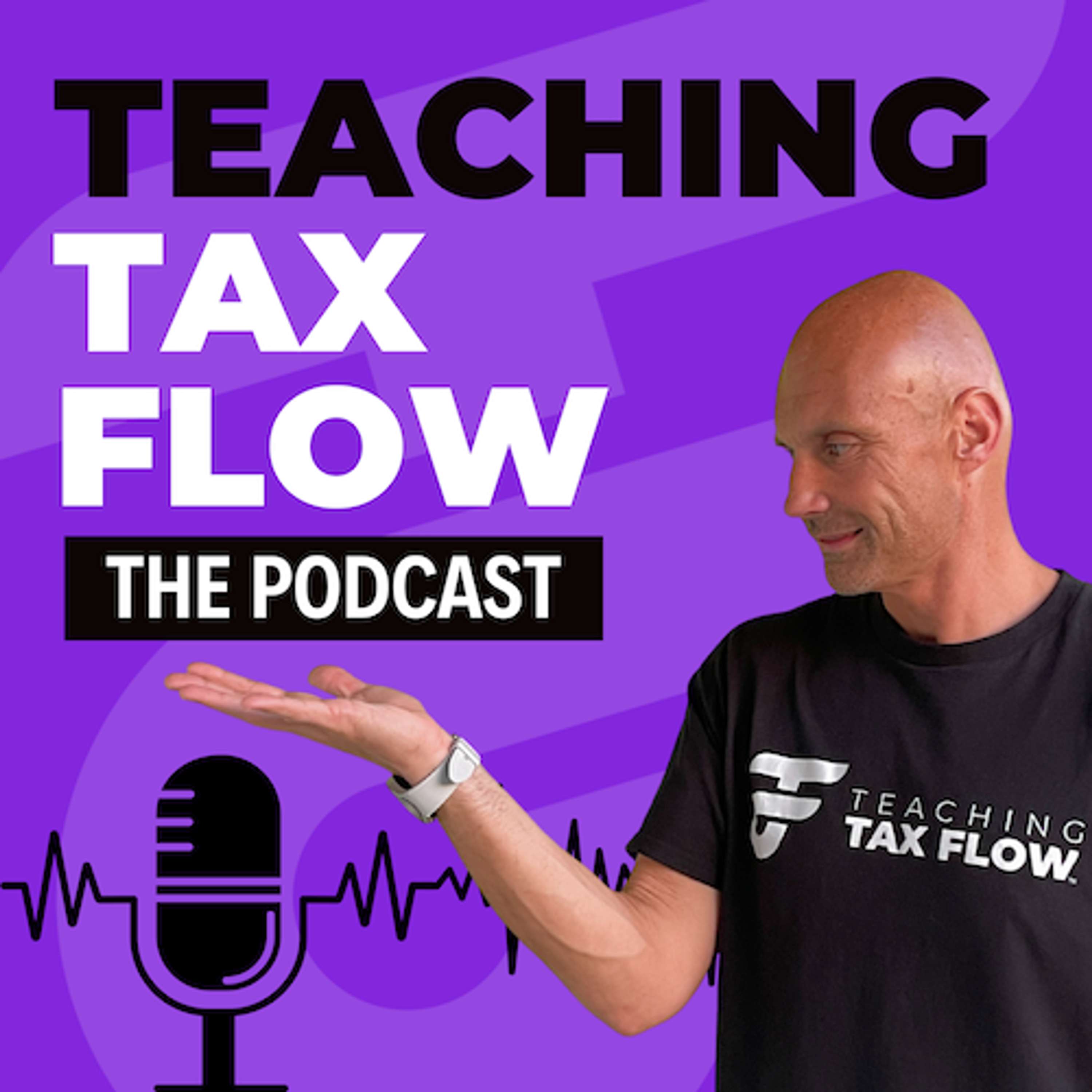Discover Teaching Tax Flow: The Podcast
Teaching Tax Flow: The Podcast

Teaching Tax Flow: The Podcast
Author: Chris Picciurro and John Tripolsky
Subscribed: 20Played: 233Subscribe
Share
© Teaching Tax Flow
Description
Welcome to “Teaching Tax Flow: The Podcast”, the show that’s all about demystifying taxes and helping you keep more of your hard-earned income in your pocket.
Hosted by tax experts from the Teaching Tax Flow team, this unfiltered (but clean) podcast is designed to empower you with the knowledge and tools you need to confidently navigate the world of taxes. We’ll cover everything from understanding tax laws and regulations to maximizing deductions and credits.
In each episode, we’ll break down a specific tax-related topic in a clear and accessible way, providing practical tips and strategies you can use to optimize your tax situation. We’ll also answer listener questions, share the mic with amazing guests, and share real-world examples to help illustrate key concepts.
Whether you’re a freelancer, small business owner, real estate investor, or just looking to understand your taxes better, this podcast is for you. So tune in, take notes, and start building your confidence in taxes today.
Produced and hosted by Teaching Tax Flow.
www.TeachingTaxFlow.com
Hosted by tax experts from the Teaching Tax Flow team, this unfiltered (but clean) podcast is designed to empower you with the knowledge and tools you need to confidently navigate the world of taxes. We’ll cover everything from understanding tax laws and regulations to maximizing deductions and credits.
In each episode, we’ll break down a specific tax-related topic in a clear and accessible way, providing practical tips and strategies you can use to optimize your tax situation. We’ll also answer listener questions, share the mic with amazing guests, and share real-world examples to help illustrate key concepts.
Whether you’re a freelancer, small business owner, real estate investor, or just looking to understand your taxes better, this podcast is for you. So tune in, take notes, and start building your confidence in taxes today.
Produced and hosted by Teaching Tax Flow.
www.TeachingTaxFlow.com
107 Episodes
Reverse
Episode Summary:In this insightful episode of the Teaching Tax Flow podcast, hosts delve into the tax proposals of former President Donald Trump, as part of their White House Walkthrough series. With input from tax expert Chris Picciurro, the episode breaks down Trump's proposed reforms, comparing them to both current policy and Vice President Harris's outlined plans. It offers a deep dive into potential impacts on business taxes, capital gains, deductions, and the estate tax, providing listeners with a nuanced understanding of how these changes might affect individuals and businesses alike.Throughout the episode, TTF highlights Trump’s significant tax strategies, including the proposed reduction of corporate tax rates and the introduction of tariffs on imports, particularly from China. Chris Picciurro emphasizes the potential permanency of the Tax Cuts and Jobs Act of 2017 and its implications for both business and personal taxes. The hosts explore contentious subjects such as the exemption of Social Security benefits from tax and the uncharted territory of exempting tip and overtime income from taxation, providing listeners with crucial insights into how these policies could reshape the financial landscape.Key Takeaways:Former President Trump proposes reducing the corporate tax rate and potentially implementing a 15% rate for companies manufacturing in the U.S.Plans are on the table for exempting Social Security and tip income from taxation, alongside making the Tax Cuts and Jobs Act of 2017 permanent.A proposed 10-20% baseline tariff on all U.S. imports, with a 60% tariff on Chinese imports, could have wide-reaching economic implications.The reinstatement of unlimited deductions for state and local taxes (SALT) could significantly benefit high-income earners in higher-tax states.Exempting overtime pay from federal taxation is among the unique tax proposals discussed, impacting many American workers.Notable Quotes:"Your marginal tax rate is way more important than your tax bracket.""The estate tax exemption now, if it comes back down, is going to hit a lot of people that it wouldn't really affect before.""We're doing the best we can here to compare apples and apples, not apples and oranges too much.""Tax laws are written to encourage and discourage certain behavior.""Taxes are on sale. Taxes would potentially go on sale permanently."Episode Sponsor:Strategic Associates, LLCRoger Roundywww.linkedin.com/in/roger-roundy-86887b23Listen to the full episode to explore comprehensive insights into Trump’s tax plan proposals and how they could potentially impact your financial strategies. Stay tuned for more enlightening content from the Teaching Tax Flow podcast as they continue to provide expert tax insights and strategies.
(00:04) - Exploring Trump's Tax Proposals on Teaching Tax Flow Podcast
(02:39) - Trump's Tax Proposal and Its Impact on Corporate Taxes
(08:16) - Understanding Tax Credits, Deductions, and Their Impact on Income
(11:31) - Estate Tax Changes and Their Impact on Middle America
(15:32) - Trump's Tax Proposals and Their Impact on Individuals
(19:27) - Proposals for Tax Exemptions and Tariffs Impacting the Economy
(28:06) - Exploring Tax Proposals and Community Engagement in Finance
In this episode of the Teaching Tax Flow podcast, hosts John and Chris delve into the politically charged waters of taxation as part of their White House Walkthroughs series, covering proposed tax changes by current candidates. The focus for this episode is Vice President Kamala Harris's tax proposals, analyzed strictly from a factual perspective using reliable resources like the Tax Foundation. Chris Picciurro outlines the potential impacts on both corporate and individual taxation, navigating listeners through the intricate possibilities of future tax policies.This episode examines Harris's initiatives regarding key areas such as business taxes, capital gains, and tax credits. The hosts explain the implications of increasing the corporate tax rate to 28% and taxing long-term capital gains at a higher rate for high-income earners. They highlight proposed changes to the net investment income tax and the introduction of new credits and deductions for tips, families, and housing. As the conversation progresses, Chris outlines the potential broader economic impacts of these proposals, equipping listeners with an informed understanding of what these political discussions might mean for their tax strategies.Key Takeaways:Vice President Kamala Harris proposes increasing the corporate tax rate to 28%, significantly impacting C corporations.Changes to capital gains and dividends tax rates could see increases for high-income earners, introducing a higher tax burden on incomes over $1 million.Expanding tax credits, such as the child tax credit and earned income credit, aims to provide financial relief across various taxpayer demographics.Estate and wealth taxes remain a critical focus area, with potential adjustments given the expiration of the Tax Cuts and Jobs Act.Economic implications of these proposed changes could result in a shift in gross domestic product and employment levels according to tax analysis.Resources:Tax Foundation (taxfoundation.org)Episode Sponsor:The Mortgage ShopListeners are encouraged to explore the complete episode to grasp the nuances of these tax policy discussions and anticipate how they might tailor their own tax strategies effectively. Stay tuned for the subsequent episode, which will cover the proposals by the other major candidate, providing a full spectrum view of potential future taxation landscapes.
(00:04) - White House Walkthroughs: Analyzing Kamala Harris's Tax Proposals
(04:53) - Proposed Tax Increases on Corporations and High-Income Capital Gains
(08:50) - Proposed Tax Changes and Their Impact on Income and Deductions
(15:34) - Proposed Tax Credit Expansions for Families and Homebuyers
(22:31) - Tax Planning Amid Potential Legislative Changes and Economic Impacts
(32:32) - Upcoming Podcast on Trump's Proposals and Tax Changes
About the Guest: Chrissy Siders Chrissy is a seasoned professional in the credit union industry, having begun her career in 1998. A degree holder from Michigan State University, Chrissy has developed a deep understanding of the financial industry through her extensive work in compliance, fraud, security, and internal audit. Since 2017, she has served as the President and CEO of True Community Credit Union, headquartered in Jackson, Michigan. Under her leadership, the credit union has expanded significantly, undergoing mergers and converting from a federal to a state charter, illustrating her commitment to strategic growth and technology enhancements.Episode Summary:In this episode of the Teaching Tax Flow podcast, co-hosts Chris Picciurro and John Tripolsky delve into the intriguing world of financial institutions, focusing on the distinctions and similarities between banks and credit unions. Joining them is Chrissy Siders, the knowledgeable President and CEO of True Community Credit Union, who shares her insights and expertise accumulated over a career that spans more than two decades.Through engaging dialogue, the episode sheds light on how credit unions and banks differ in their structure, membership requirements, and community involvement, drawing attention to how credit unions operate as not-for-profit cooperatives versus the for-profit orientation of banks. Chrissy Siders elaborates on the evolutionary path of credit unions, detailing their increased involvement with both personal and business banking, and highlighting the notable technological advancements that make credit unions competitive in today's digital-first landscape. Listeners will gain a deeper understanding of these financial institutions and be encouraged to consider the best fit for their personal and business banking needs.Key Takeaways:Credit unions differ fundamentally from banks in their not-for-profit cooperatives structure, with volunteer boards elected by members, contrasting with banks' profit-driven models with shareholders.Credit unions are deeply embedded in community engagement, often extending beyond regulatory expectations to deliver impactful local support and services.Technological innovation is a priority for credit unions like True Community, with significant investments in digital tools to facilitate banking processes and enhance member experience.The eligibility for membership in credit unions involves specific qualifications related to community ties, unlike banks that open accounts to any prospective customer.Credit unions are increasingly competitive in offering business, home, and specialty loans, often personalizing services to ensure comprehensive member financial support.Notable Quotes:"Credit unions are not for profit. We operate with the intent not to make some gigantic profit margin, but to invest back in our members." – Chrissy Siders"It's inherent in our DNA and our business model to be deeply ingrained in the community." – Chrissy Siders"Your money is just as safe in a credit union as it is in a bank, backed by adequate insurance." – Chrissy Siders"We want to partner with you in writing a life story that stretches beyond your imagination." – Chrissy Siders"We can't cookie-cutter approach to everybody. Every individual human is different." – Chrissy SidersResources:True Community Credit UnionEpisode Sponsor:Integrated Investment Groupwww.integratedig.com
(00:04) - Comparing Banks and Credit Unions: Differences and Similarities
(03:44) - Credit Union Industry Insights with Chrissy Siders
(07:49) - Differences Between Credit Unions and Banks in Structure and Community Impact
(18:27) - Credit Unions' Technological Investments and Fintech Competition
(22:13) - Credit Unions' Unique Approach to Banking and Risk Management
(30:06) - Exploring Credit Union Benefits and Community Engagement in Michigan
About the Guest: Alec Hutchin Alec is the Vice President of Investments for MDS Energy Development, LLC. He holds a degree in economics and has a deep-rooted passion for the natural gas industry, having grown up in western Pennsylvania’s “Gasland.” Alec's career in the oil and gas sector began after an intriguing conversation with Michael Snyder of Snyder Brothers, leading to his pivotal role in raising investments for alternative energy projects. Known for his comprehensive understanding of the industry and the tax benefits associated with oil and gas investments, Alec is an avid supporter of his local economy and an enthusiastic Pittsburgh sports fan.Episode Summary:In this episode of the Teaching Tax Flow podcast, hosts Chris Picciurro and John engage in an enlightening conversation with Alec Hutchin, Vice President of Investments for MDS Energy Development, LLC. The discussion delves deep into the intriguing world of oil and gas investment, an area known to offer significant tax benefits but often perceived as exclusive to wealthy individuals. Alec demystifies these tax advantages, explaining concepts like intangible drilling costs (IDC), percentage depletion allowance, and the potential for using oil and gas investments as a strategy for failed 1031 exchanges. This episode not only highlights the financial perks but also emphasizes the broader economic and community benefits of investing in domestic energy production.Throughout the discussion, Alec shares his journey from aspiring economist to key player in Pennsylvania’s natural gas industry, underscoring the pivotal role of unconventional energy investments in driving local economies. He provides listeners with essential insights into the tax dynamics of oil and gas investments, such as the 100% deduction of IDCs in the first year and the 15% income exclusion via percentage depletion allowance. Alec also gives practical advice on what to look for when considering such investments, making this episode a valuable resource for both current and potential investors interested in diversifying their portfolios and optimizing their tax strategies.Key Takeaways:Intangible Drilling Costs (IDC): Investors in oil and gas projects can claim up to 100% of their investment as a deduction in the first year of drilling.Percentage Depletion Allowance: 15% of the income received from oil and gas investments is tax-free, enhancing the investment’s appeal.Failed 1031 Exchange Strategy: Oil and gas investments can serve as an effective remedy for managing the tax burden from a failed 1031 exchange.Investment Accessibility: Modern scalability and financial models have made oil and gas investments more accessible to a broader range of investors.Critical Considerations: Key aspects to evaluate include project leverage, geological understanding of the drilling location, and the experience of the operating team.Notable Quotes:Alec Hutchin: "We're really excited for what we have in place currently in the states, to be able to really boost and help these tax strategies that you have that you're forming right now."Chris Picciurro: "It's kind of like bonus depreciation that you don't have to recapture."Alec Hutchin: "One of the most powerful codes in the Internal Revenue Code today."Alec Hutchin: "We need affordable energy to make sure that single moms can feed their kids and to make sure that we can still continue to maintain a really prosperous life for the middle class."Chris Picciurro: "It's really cool that you have stayed close to home."Episode Sponsor:REPStrackerwww.repstracker.com/affiliate/teachingtaxflow (CODE: IFG)
(00:00) - Tax Benefits of Investing in Oil and Gas
(03:51) - From Economics to Natural Gas: A Journey Back Home
(08:54) - Tax Advantages of Intangible Drilling Cost Deductions in Oil Investments
(15:39) - Tax Benefits and Strategies for Oil and Gas Investments
(20:24) - Key Considerations for Investing in Oil and Gas
(22:43) - Exploring Alternative Investments and Their Impact on America
In this episode appropriately titled, "Bonus Depreciation Explained," we aim to demystify one of the most queried topics in the tax community. Chris explains the fundamental principles of bonus depreciation, underlining its relevance and the strategic advantage it offers to businesses, particularly small entities and real estate investors. Listeners are treated to practical examples that illustrate how bonus depreciation can be maximized and the potential pitfalls to be wary of.During this episode, Chris clarifies the specific IRS codes and tax laws governing bonus depreciation and elaborates on the implications of the Tax Cuts and Jobs Act. The episode also covers scenarios such as business asset purchases, the sale of depreciated property, and recapture rules. By simplifying these complex tax concepts, Chris ensures that both novice and experienced taxpayers understand how to leverage bonus depreciation for significant tax savings and compliance. The hosts use real-world examples, like the purchase of industrial equipment and vehicles, to bring clarity to these tax strategies.Key Takeaways:Definition and Importance: Bonus depreciation is a tax incentive allowing businesses to deduct a significant portion of the cost of qualified property in the year it is placed in service.Qualifying Assets: It can be applied to both new and used assets, provided they are new to the purchasing business.Recapture Rules: Depreciation recapture applies if business use of an asset declines below 50% or if the asset is sold.Planning and Strategy: Strategic planning is essential to decide whether to use bonus depreciation, particularly when considering future asset use and potential tax rate changes.Tax Cuts and Jobs Act Impact: The Act significantly expanded bonus depreciation, including used assets, and set a phase-down schedule starting from 2023.Notable Quotes:"Tax laws are written to encourage or discourage certain behavior... this tax law is written to encourage businesses to invest in fixed assets." - Chris Picciurro"Bonus depreciation allows you to front-load a percentage of the asset purchase into the first year and spread the remaining amount over the life of the asset." - Chris Picciurro"The depreciation schedule is vital in keeping track of how much of the asset has been depreciated and what remains." - Chris Picciurro"Placed into service is the most important date for bonus depreciation eligibility." - Chris Picciurro"You don't have to use bonus depreciation; you can elect out if it makes better tax sense." - Chris PicciurroEpisode SponsorSunsets & Dinkswww.teachingtaxflow.com/pickleballCODE: TTF15
(00:05) - Excitement Over Bonus Depreciation and Detroit Tigers' Playoff Hunt
(03:16) - Understanding Bonus Depreciation and Its Economic Implications
(05:37) - Understanding Bonus Depreciation for Small Business Investments
(10:37) - Understanding Depreciation Recapture and Bonus Depreciation Strategies
(18:35) - Understanding Depreciation Schedules and Bonus Depreciation Changes
(27:29) - Teaching Tax Flow Podcast: Winter Prep and Listener Engagement
About the Guest: Caden Gunnell Caden is a Junior Partner at Strategic Associates, where he specializes in proactive tax planning and solution implementation for high-income earners, real estate investors, and successful entrepreneurs. With a background in business strategies and tax planning, Caden has been instrumental in connecting clients with innovative tax-saving solutions, such as leveraged charitable giving. His expertise ensures clients are well-positioned to maximize their tax benefits while contributing to worthy causes.Episode Summary:Welcome to episode 101 of the Teaching TaxFlow podcast where hosts John and Chris dive deep into the world of leveraged charitable giving with expert guest Caden Gunnell from Strategic Associates. This episode uncovers how leveraging charitable donations can significantly enhance tax deductions for high-income earners, making it a must-listen for anyone looking to optimize their tax strategies.Leveraged charitable giving is a powerful tool for individuals, especially those with high W-2 incomes, to increase their tax efficiency and charitable impact. Throughout the episode, Caden explains how individuals can turn a simple donation into a multi-fold tax deduction through strategic planning. Chris and Caden delve into the mechanics of this tax strategy, its benefits, the documentation required, and the types of clients who can benefit most from it. They emphasize the importance of having substantiation to avoid IRS scrutiny and explore how this strategy can fit into a broader tax optimization plan.Key Takeaways:Leveraged Charitable Giving: This strategy involves using a certain amount of cash to create a larger donation value, effectively multiplying the tax deduction.Documentation and Compliance: Proper substantiation through official appraisals and gift receipts is critical to ensure compliance and maximize tax benefits.Eligibility and Benefits: Best suited for individuals with taxable incomes of $250,000 or more, this strategy is highly beneficial for those with a charitable inclination.Yearly Flexibility: Unlike some long-term commitments, leveraged charitable giving can be assessed and implemented on a year-by-year basis.Stacking Strategies: Leveraged charitable giving can be combined with other tax strategies to further reduce taxable income, especially for business owners.Notable Quotes:"We're taking a certain dollar amount and creating a one to three, one to four, and sometimes as high as one to five donation." — Caden Gunnell"This isn't being done just to help someone save money in taxes. Anytime we're doing anything to save money in taxes, if that's our only goal, we're probably not doing the right things." — Caden Gunnell"Your tax insurance return shouldn't be a sprint; it should be a half marathon and something you think about all year round." — Chris Picciurro"The IR's is getting extremely more sophisticated and they are using AI and they are using technology to find anomalies." — Chris PicciurroEpisode Sponsor:Strategic Associates, LLCRoger Roundywww.linkedin.com/in/roger-roundy-86887b23Hear more about how you can leverage your charitable donations to maximize your tax deductions by tuning into the full episode. Stay tuned for more insightful tips and strategies on the Teaching TaxFlow podcast!
(00:03) - Leveraged Charitable Giving and Tax Strategies for high-earners
(06:36) - Leveraging Charitable Giving for Maximized Tax Deductions
(13:50) - Understanding Tax Strategies and Their Impact on Individuals
(16:42) - Leveraged Charitable Giving Strategies for High-Income Earners
(24:37) - Teaching Tax Flow Podcast: Insights and Resources
Welcome to the 100th episode of the Teaching Tax Flow podcast! (we've gone visual - watch this full episode on our YouTube channel)In this milestone episode, hosts John Tripolsky and Chris Picciurro celebrate their journey from humble beginnings to becoming a top-tier resource in tax planning and strategy. They reflect on the podcast's inception—starting with a microphone perched on a pizza box—and the evolution of their content, community, and reach. The hosts express gratitude to their loyal listeners, engaging guests, and supportive sponsors, while also unveiling exciting changes ahead, including YouTube integration and expanded free educational resources.As the podcast grew from its initial focus on real estate market spotlights to a broader tax planning scope, John and Chris discuss key milestones and listener engagement. They underscore the importance of building a community to drive content and share real-world applications of tax strategies. Looking ahead, the hosts emphasize their commitment to delivering premium, accessible tax education for individuals and professionals alike, solidifying their standing as the voice of tax planning.Key Takeaways:Origin Story: The podcast began with a microphone clipped to a pizza box, highlighting the hosts' DIY spirit and commitment to just getting started.Community-Driven Content: Listener feedback and community engagement on platforms like the Defeating Taxes Facebook group have been crucial in shaping podcast topics.Educational Pivot: The podcast content has shifted from a specific real estate focus to a broader, holistic approach to tax planning and strategy.YouTube Expansion: All podcast episodes and comprehensive educational content will now be available on YouTube, increasing accessibility and reach.Gratitude and Evolution: John and Chris express gratitude towards all guests, listeners, and sponsors, promising continued evolution and more interactive, valuable content.Notable Quotes:"There's never a better time than now." - Chris"We are one of the top 10% of podcasts as far as longevity, and that's an accomplishment right there." - John"Our community drives our content, and that community has different pillars." - Chris"Teaching Tax Flow is not just a podcast; it's the voice of tax planning." - John"It's amazing how a community can sharpen itself and drive the direction of a podcast." - ChrisResources:Teaching Tax Flow YouTube Channel: YouTubeDefeating Taxes Facebook Group: FacebookThe Mortgage Shop: WebsiteOriginal Music Credits (Intro): Christian PicciurroEpisode Sponsor: The Mortgage ShopThis episode is a testament to the power of community-driven content and the journey from modest beginnings to influential platforms. Join John and Chris as they continue to demystify tax planning and provide practical, enlightening discussions. Stay tuned for more engaging content and educational resources from the Teaching Tax Flow podcast!
(00:02) - Celebrating 100 Episodes of Teaching Tax Flow
(04:16) - The Origin Story of a Podcast Launched on a Pizza Box
(07:18) - Evolution of a Tax Planning Podcast Driven by Community Engagement
(12:42) - A Confession from John (he's a fan of...)
(14:15) - The Evolution of Tax Planning and Podcasting
(19:09) - The Voice of Tax Planning
(29:45) - Celebrating Episode 100 with New Changes and Future Plans
About the Guest: Angelina UrquhartAngelina Urquhart is a compliance expert with Corpnet, a company specializing in business compliance and filing services. With a wealth of knowledge in entity formation and regulatory compliance, Angelina has been instrumental in helping businesses stay compliant with complex state and federal regulations. Her expertise includes navigating the Corporate Transparency Act and beneficial ownership information reporting requirements.Episode Summary:In this milestone episode, number 99, Chris Picciurro and John Tripolsky delve into the critical specifics of the Corporate Transparency Act (CTA) and Beneficial Ownership Information Reporting (BOI). Our special guest, Angelina Urquhart from Corpnet, shares her comprehensive insights and explains the new regulatory requirements that affect the majority of business entities.The Corporate Transparency Act, aimed at curbing financial crimes such as money laundering and terrorism financing, imposes stringent reporting obligations on entities in the United States. Angelina highlights which entities need to comply, what details must be reported, and the profound implications of non-compliance. Throughout the episode, the discussion touches on the practicality of these regulations, the importance of timely filing, and the potential penalties for failure to adhere to the guidelines.Key Takeaways:CTA and BOI Overview: Angelina breaks down the purpose of the Corporate Transparency Act and the Beneficial Ownership Information Reporting requirements.Entities Required to File: Most LLCs, corporations, and other registered entities must comply unless specific exemptions apply.Critical Deadlines: For new entities created in 2024, there is a 90-day compliance window. Entities formed before 2024 must file by December 31, 2024.Penalties for Non-Compliance: Significant civil and criminal penalties exist for failing to meet the reporting requirements.Practical Advice: Tips on using passports for ID verification and tracking changes to ensure ongoing compliance.Notable Quotes:Angelina Urquhart: "The days of you creating an LLC and having it owned by another LLC are still there, but you still have to now indicate who is benefiting from the operations of that entity."Angelina Urquhart: "Something as easy as a driver's license expiring or you move...if you move, there's a filing requirement."Chris Picciurro: "The penalties for not conforming to this are significant."Angelina Urquhart: "This isn't going away, it's a safety belt from financial crimes."Get started today on being compliant!Visit www.teachingtaxflow.com/entity and hover over "Run a Business" in the header menuClick on "Compliance Service"Select "BOI Reporting"Use the discount code "TTF" at checkout for a 5% discount.Have more questions on BIO?Schedule a discussion with our guest, Angelina.BOOK NOWEpisode Sponsor:Integrated Investment Groupwww.integratedig.com
(00:04) - Exciting Insights on Accredited Investors and Financial Success
(02:59) - Understanding the Corporate Transparency Act and Beneficial Ownership Reporting
(13:02) - Navigating Business Ownership Changes and Compliance Requirements
(19:09) - The Evolution of Seatbelt Use and Safety Regulations
(20:32) - Compliance Deadlines and Penalties for New Business Entities
(23:46) - Navigating Business Compliance and Avoiding Financial Pitfalls
Welcome to Episode 98 of the Teaching Tax Flow podcast! In this episode, hosts Chris Picciurro and John Tripolsky delve into the often-overlooked pitfalls in tax planning, aptly referred to as the "Top Three Tax Landmines." They aim to educate real estate investors and other listeners on how to navigate the treacherous waters of tax obligations.The discussion starts with Chris elaborating on depreciation recapture — the sudden surge in taxable income when you sell an asset you've previously claimed depreciation on. This intricate tax rule can catch you off guard if you are not prepared, especially in scenarios involving vehicles and real estate investments. Next, they explore phantom income, income that appears on your tax returns without actual cash realization. Often emerging from scenarios like cancellation of debt, partnership income, and barter transactions, phantom income can unexpectedly inflate your tax liability. Lastly, they examine the hazards of under-withholding taxes, particularly when experiencing significant life changes like job transitions or marital status modifications, which can cause a shortfall in tax payments.Their conversation is enriched with tangible examples and actionable advice, highlighting the critical importance of tax planning. Chris and John delve into how a strategic approach to taxes can save you from unexpected financial burdens. For those looking to stay proactive with their taxes, this episode is a treasure trove of insights.Key Takeaways:Depreciation Recapture: When selling an asset for which you've claimed depreciation, you may need to include some of the previously deducted amounts as taxable income. This often surprises sellers who do not receive any cash but owe taxes on the gain.Phantom Income: Income that appears on paper but does not provide actual cash, such as cancellation of debt, partnership income, or barter transactions, can lead to significant tax liabilities.Under-Withholding Risks: Life changes such as job transitions, marital status changes, or adjustments in income can lead to under-withholding of taxes, resulting in an unexpected tax bill at year-end.10% Penalty for Early Retirement Distributions: Taking early distributions from a retirement account before age 59½ without qualifying for an exception can result in a 10% penalty in addition to regular tax liabilities.401(k) Loan Pitfalls: If you leave your job, an outstanding 401(k) loan can become due immediately, creating taxable income and potentially subjecting you to a 10% penalty if not repaid promptly.Notable Quotes:"Tax flow does not equal cash flow." - Chris Picciurro"Depreciation recapture can be a phantom income — no cash in your hands, but you owe tax." - Chris Picciurro"Ignorance is not bliss when it comes to taxes. Ignorance is expensive." - John Tripolsky"Just because taxes are withheld doesn't mean it's enough to pay what you owe." - Chris Picciurro"With tax planning, you're not just preparing for the year-end. You're setting yourself up for a lifetime of tax efficiency." - John TripolskyEpisode Sponsor:REPStrackerwww.repstracker.com/affiliate/teachingtaxflow (CODE: IFG)
(00:04) - Top Three Tax Landmines and How to Avoid Them
(07:25) - Depreciation Recapture Pitfalls in Vehicle and Real Estate Transactions
(12:32) - Tax Pitfalls, Atari Memories, and Italian Family Traditions
(14:39) - Understanding Phantom Income and Its Tax Implications
(19:53) - Tax Planning, Phantom Incomes, and Business Advice
(21:12) - Common Tax Landmines and How to Avoid Them
(27:29) - The Importance and Benefits of Tax Planning
In Episode 97 of the Teaching Tax Flow podcast, hosts Chris and John delve into a powerful tax strategy, explaining how to income shift to family members or children. With the countdown to the 100th episode underway, this topic is timely and significant for business owners looking to control their tax liabilities. Chris and John unravel the intricacies of legally and ethically leveraging family members to optimize tax obligations, emphasizing that this strategy is not to be taken lightly or implemented illicitly.Throughout the episode, Chris and John explore the benefits and implementation process of paying children for legitimate work in your business. By shifting income to lower tax brackets, parents can significantly reduce their overall tax burden. The discussion covers the importance of proper documentation, legitimate job roles, the advantages of different business structures, and the potential for utilizing earned income for additional benefits like Roth IRA contributions. Real-world examples make this episode a practical guide for those eager to harness this tax-saving strategy.Key Takeaways:Legitimate Employment: Children must perform bona fide work suitable for their age and capabilities to be paid.Reasonable Compensation: Compensation must align with the nature of the work performed, avoiding any excessive payments that could raise red flags.Proper Documentation: Maintain thorough records similar to those for any other employee, including timesheets, task records, and payroll tax filings.Tax Benefits: Income shifted to children often incurs a lower tax rate or becomes tax-free, and specific conditions eliminate Social Security and Medicare taxes.Roth IRA Contributions: Children’s earned income allows for contributions to a Roth IRA, promoting long-term, tax-free growth of their earnings.Notable Quotes:"The first benefit of paying kids is shifting the income to a lower marginal tax rate within the family." - Chris Picciurro"If you want to be a duck, you got to walk like one and quack like one." - Chris Picciurro"Ideas are cheap and implementation is valuable." - Chris Picciurro"Highest and best use...identifying what you're good at and sticking to it." - John TripolskyEpisode SponsorSunsets & Dinkswww.teachingtaxflow.com/pickleballCODE: TTF15
(00:04) - Income Shifting to Family Members for Tax Benefits
(06:40) - Benefits and Legalities of Income Shifting by Paying Children
(09:58) - Legal Tax Strategies Versus Risky Cheat Codes
(10:49) - Tax Benefits and Legalities of Paying Your Children
(19:21) - Tax-Free Growth Strategies for Teenagers
(21:45) - Legitimate Ways to Save Money by Employing Your Children
On this episode of the Teaching Tax Flow podcast, we jump into the intricacies of "Hobby Loss Rules." Aimed at demystifying the often confusing threshold between hobbies and businesses, the hosts break down how the IRS defines and treats these activities differently for tax purposes. The discussion is particularly timely given the changes brought about by the Tax Cuts and Jobs Act of 2017, which altered how hobby expenses are deducted.Throughout the episode, Chris and John explain the nine-factor test the IRS uses to determine whether an activity is a hobby or a business. They illustrate these points with relatable examples, such as the potential tax implications of John's "passion" for knitting and dog breeding. The hosts also stress the importance of maintaining detailed records and having a clear profit motive to ensure an activity is classified as a business, thereby allowing for the deduction of legitimate expenses on your tax return.Key Takeaways:IRS Hobby vs. Business: Understand the IRS's nine-factor test to determine if an activity is a hobby or a business.Tax Reporting: Recognize how to report income and expenses from hobby activities versus business activities.Impact of Tax Cuts and Jobs Act: Learn how changes from the 2017 Tax Cuts and Jobs Act affected the deduction of hobby expenses.Practical Examples: Real-world scenarios provided to illustrate what counts as a hobby and what qualifies as a business.Next Steps: Practical advice on maintaining proper records and showing profit motives to ensure your activity is seen as a business.Notable Quotes:"The main issue is whether an activity is a hobby or business in the eyes of the IRS.""Profit motive is crucial; hobbies typically have little effort to acquire the necessary expertise to consult a professional.""For an expense to be deductible in your tax return for a business, the expense has to be ordinary and necessary.""Under the Tax Cuts and Jobs Act of 2017, hobby expenses are no longer deductible, making it crucial to ensure your activity is classified correctly.""The IRS provides a safe harbor guideline, known as the three out of five-year rule, which presumes profit motive if an activity generates profit in three out of five consecutive years."Episode Sponsor:The Mortgage Shop
(00:04) - Understanding Hobby Loss Rules to Minimize Lifetime Taxes
(02:58) - Hobby Versus Business: Tax Reporting and Rule Changes
(05:18) - Discussing Hobbies, Movies, and Financial Losses from Knitting
(07:13) - Determining If an Activity Is a Hobby or Business
(11:18) - Hobby vs. Business: The Gray Area of Tax Deductions
(12:27) - Determining Business vs. Hobby for Tax Purposes
(15:07) - Tax Implications of Hobby vs Business Income
(18:53) - Hobby Income Reporting and 1099K Changes
(19:55) - Business vs. Hobby: Tax Implications for Dog Breeding
(22:06) - Listener Appreciation and Engagement in the Defeating Taxes Podcast
(24:18) - Educational Investment and Tax Advice Disclaimer
About the Guest:Todd Jackson: Todd Jackson is a highly experienced tax attorney, M&A advisor, and real estate attorney based in Franklin, Tennessee. Known for his expertise in Deferred Sales Trusts (DSTs), 1031 exchanges, and complex tax planning strategies, Todd has worked closely with clients to help them minimize tax liabilities on large capital gains. He is also a licensed real estate agent and title insurance agent, showcasing his diverse skill set in the financial and legal sectors.Episode Summary:In this episode of the Teaching Tax Flow podcast, hosts John and Chris are joined by special guest Todd Jackson to explore the intricacies of Deferred Sales Trusts (DSTs). As Episode 95 counts down to their milestone 100th episode, the team delves into how DSTs can empower and educate high-income earners, real estate investors, and successful entrepreneurs to legally and ethically minimize taxes paid over their lifetime.Todd Jackson provides a thorough comparison between DSTs and 1031 exchanges, highlighting the flexibility and control DSTs offer in deferring capital gains. This episode demystifies the concept of installment sales and explains how DSTs can alleviate some of the stringent requirements of 1031 exchanges, such as debt replacement and time constraints. With practical examples and insightful explanations, Todd emphasizes the significant tax planning benefits DSTs provide.Key Takeaways:A Deferred Sales Trust (DST) is a powerful tool for deferring capital gains taxes using installment sale treatment.DSTs provide more flexibility and fewer restrictions compared to 1031 exchanges, particularly regarding replacement debt and investment options.It's essential to have the DST structure in place before any sale occurs to avoid triggering taxable events.The minimum capital gain for considering a DST is generally around $500,000 to justify the structure's complexity and cost.Timing and control are critical components of a DST, allowing the deferral of income recognition over several years while preserving and growing the trust's assets.Notable Quotes:"My phone usually rings when somebody's selling something and facing a capital gain." - Todd Jackson"Would you rather pay something today or ten years from now? Most people are going to say they'd prefer to pay it later." - Todd Jackson"We have to create this and maintain it in a way that prevents you from having a constructive receipt to where that triggers all the gains." - Todd Jackson"The relationship between the trust and you as the seller is that of an installment sale, which is borrower and lender." - Todd Jackson"DSTs can invest in anything. The conversation is more about what it should invest in, based on risk tolerance and preservation strategy." - Todd JacksonResources:Todd Jackson Law: WebsiteJoin us next week for another insightful episode of the Teaching Tax Flow podcast, where we continue to bring you expert advice and actionable strategies to optimize your tax planning. Don't miss the countdown to our 100th episode!Stay tuned and keep following us on Facebook, Twitter, and LinkedIn for more updates and exclusive content.Episode Sponsor:Strategic Associates, LLCRoger Roundywww.linkedin.com/in/roger-roundy-86887b23
(00:04) - Deferred Sales Trusts and Year-End Tax Planning Strategies
(04:55) - Deferring Capital Gains Taxes Through Installment Sales
(09:56) - Choosing Flight Times and Recognizing Income
(10:49) - Comparing 1031 Exchanges and Deferred Sales Trusts
(16:20) - Deferring Capital Gains Through Installment Sales and Trusts
(21:25) - Deferred Sales Trusts for Large Capital Gains
(26:00) - Fun Questions and Career Insights with Todd Jackson
In this episode of the Teaching Tax Flow podcast, hosts Chris and John dive deep into the fascinating intersection of Olympic athletes and taxation. As the Olympic Games captivate viewers worldwide, this episode shifts focus to an often overlooked aspect of an athlete's journey – the tax implications of winning medals and earning prize money.The episode begins with Chris shedding light on the monetary rewards that athletes receive from the United States Olympic Committee (USOC) and introduces the Olympians and Paralympians Act of 2016, which exempts certain athletes from federal income taxes on the value of their medals and prize money. John and Chris discuss the complex layers of taxation that athletes, especially Olympians, might face, including foreign income taxes and the practicalities of tax planning. They also reflect on their recent experience at the Taxposium in Orlando, highlighting key themes like the importance of technology and continuous education in modern tax practices.Key Takeaways:Olympic Prize Money: Olympic athletes receive significant prize money from the USOC – $37,500 for a gold medal, $22,500 for silver, and $15,000 for bronze.Tax on Medals and Prize Money: Both the monetary winnings and the value of the Olympic medals are considered taxable income. However, under the Olympians and Paralympians Act of 2016, athletes with an adjusted gross income under $1 million ($500,000 if married filing separately) are exempted from federal taxes on these earnings.Foreign Tax Considerations: Athletes earning income in foreign countries may be subject to those countries' taxes but may receive a foreign tax credit in the US to avoid double taxation.Ordinary and Necessary Deductions: Olympians, considered self-employed, can deduct ordinary and necessary business expenses related to their athletic training and competitions, such as travel, coaching, and equipment.Professional Insights: The episode emphasizes the importance of specialized tax knowledge and ongoing education, drawing insights from the recent Taxposium conference attended by the hosts.Notable Quotes:"Olympians receive prize money from the USOC for winning medals – $37,500 for gold, $22,500 for silver, and $15,000 for bronze." – Chris"The value of the Olympic medal is considered taxable income, along with the prize money." – Chris"Under the Olympians and Paralympians Act of 2016, your medal prize money can be exempt from federal income taxes if your AGI is under a certain threshold." – Chris"It's really neat to see how much emphasis is being placed on technology and modernizing the profession at these tax conferences." – John"Ideas are cheap and implementation is valuable; that's why tax planning is so crucial." – ChrisResources:Teaching Tax FlowOlympians and Paralympians Act of 2016Defeating Taxes CommunityNational Association of Tax Professionals (NATP)Episode Sponsor:Legacy Lock (www.teachingtaxflow.com/legacy)DISCOUNT CODE: Magic1495
(00:04) - Olympic Athletes and the Impact of Taxes
(02:44) - Taxposium: The Super Bowl of Tax Conferences
(10:23) - Tax Implications for Olympians and Their Prize Money
(13:16) - Tax Implications for Olympians Winning Medals and Prize Money
(15:41) - Employment Status of Professional Athletes in Team Sports
(17:09) - Tax Planning Strategies for Olympians' Prize Money
(19:16) - Navigating Double Taxation for US Residents Earning Foreign Income
(21:06) - Tax Implications for Olympians as Independent Contractors
(23:12) - Tax Implications and Value of Olympic Medals
(26:41) - Understanding Complex Tax Codes and IRS Efforts
Episode Summary:In this episode of the Teaching Tax Flow podcast, hosts Chris and John dive into the critical question many homeowners face: should one sell or rent their personal property after moving out? This episode expertly navigates the tax implications, financial considerations, and emotional factors homeowners must weigh when making this decision. With practical insights and real-life examples, the hosts break down complex tax topics like the Section 121 exclusion and depreciation recapture, as well as explore the financial and emotional implications of turning a primary residence into a rental property.The discussion kicks off with Chris detailing the Section 121 exclusion, which allows homeowners to exclude up to $500,000 in capital gains from the sale of their primary residence if they meet specific requirements. The hosts then delve into the realities of rental income and the benefits of depreciation deductions. They emphasize that blending tax strategies can often lead to the most beneficial outcomes. Financial considerations such as market conditions, cash flow, and long-term investments also come under the spotlight, alongside the emotional aspects that might influence an owner's decision to sell or rent their property.Key Takeaways:Section 121 Exclusion: Homeowners can exclude up to $500,000 in capital gains from tax if their property was their primary residence for two of the last five years.Depreciation Benefits: The rental property allows for depreciation deductions, reducing taxable income and potentially making rental income tax-free.Market Conditions: Understanding the real estate market is crucial—selling at a market peak might provide better financial outcomes than renting.Emotional Considerations: Long-standing personal connections to a property can influence the decision to rent rather than sell.Blending Tax Strategies: Effective tax planning often involves combining multiple strategies, like using the 1031 exchange to avoid depreciation recapture.Notable Quotes:"Tax strategies don't live in a bubble. They are meant to be blended together." - Chris Picciurro"If you rent your property, the time starts ticking on you taking advantage of the Section 121 or capital gain tax exclusion." - Chris Picciurro"When you have a significant capital gain, sometimes it's the best move to sell and take that money tax-free." - Chris Picciurro"Cash flow does not equal tax flow, meaning if you rent a property for $2,500 net, that doesn't mean you have to pay tax on that $2,500." - Chris Picciurro"Don't let the tax tail completely wag the dog." - Chris PicciurroEpisode SponsorSunsets & Dinkswww.teachingtaxflow.com/pickleballCODE: TTF15
(00:04) - Sell or Rent Your Property: Key Considerations
(04:54) - Tax Considerations When Deciding to Rent or Sell Your Home
(08:00) - Navigating Real Estate Decisions and Market Timing
(10:09) - Tax Implications of Renting Versus Selling Property
(14:43) - Blending Tax Strategies for Optimal Financial Outcomes
(18:09) - Maximizing Cash Flow Through Strategic Property Rental
(21:45) - Navigating Market Conditions and Tax Implications in Property Management
(22:37) - Financial and Emotional Considerations in Property Investment
(24:50) - Converting Primary Residences to Rentals: Key Considerations and Timing
(29:08) - Maximizing Equity and Rental Income in Real Estate Investments
(29:41) - Upcoming Topics and Episode 100 Changes on Teaching Taxflow Podcast
This episode of the Teaching Tax Flow podcast dives deep into the complexities of car and truck deductions for businesses. Joined by a seasoned tax professional, the discussion centers on the eligibility and nuances of vehicle expense deductions, explaining what they are and what they aren't. In a detailed conversation with tax expert Shawn Flattery, listeners will learn who can claim vehicle expense deductions and the criteria involved. The episode explores the distinctions between standard mileage and actual expense deductions, the nuances of the 6000-pound vehicle rule, and the considerations between buying vs. leasing business vehicles. Through practical examples and a touch of humor, Shawn simplifies the complexities of tax laws, helping business owners make informed decisions that could lead to significant tax savings.Key Takeaways:Eligibility Criteria: Only business owners can deduct vehicle expenses, and the vehicle must be used at least 50% of the time for business purposes.Standard Mileage vs. Actual Expense: Understand the difference between standard mileage rate deductions and actual vehicle expense deductions, and when to use each method.6000-Pound Rule: Learn about the significant tax advantages for vehicles with a gross vehicle weight rating of over 6000 pounds and how this can affect your deductions.Buy vs. Lease Considerations: Get insights into the tax implications of buying versus leasing a business vehicle and which option might offer better tax benefits.Tax Credits for EVs: Discover the specific tax considerations for electric vehicles, including the impact of the $7,500 credit on depreciation limits.Notable Quotes:"If you're using the vehicle for 50% or more for business, then we can start talking about depreciating and taking actual costs." - Shawn Flattery"It's really the date that it becomes available for business use is the magic day and year. Thus, that depreciation starts and you can start taking those deductions." - Shawn Flattery"A vehicle more than 6000 pounds...expands out how much depreciation you can take in the year." - Shawn FlatteryEpisode Sponsor:Strategic Associates, LLCRoger Roundywww.linkedin.com/in/roger-roundy-86887b23
(00:04) - Understanding Car and Truck Deductions for Business Owners
(04:34) - Tax Benefits of Business Vehicle Depreciation and Expense Deductions
(14:27) - Tax Benefits of Vehicles Over 6000 Pounds
(19:59) - Buy Versus Lease: Tax Benefits and Considerations
(28:08) - Understanding Vehicle Tax Deductions and Misconceptions
In this episode of the Teaching Tax Flow podcast, hosts John and Chris delve into Chris's top three tax-free income strategies. John and Chris provide invaluable insights on how to legally and ethically minimize taxes over one's lifetime, offering listeners actionable advice on educational savings, Roth accounts, and advanced whole life insurance planning.The conversation kicks off with an immersive discussion on the benefits of 529 plans, how they offer tax-free growth for educational expenses beyond just college, and their newfound flexibility. As Chris elaborates, the emphasis shifts to the importance of incorporating Roth accounts into one's financial planning. He details the advantages of Roth IRAs and 401ks, especially highlighting the potential for tax-free growth and withdrawals. Finally, the episode rounds off with an in-depth look at advanced whole life insurance strategies, emphasizing their role in both providing life insurance protection and enabling tax-free income. Throughout the episode, Chris blends anecdotes with professional advice, making complex tax strategies accessible to all listeners.Key Takeaways:529 Plans: These educational savings plans offer tax-free growth and withdrawals if used for qualified educational expenses, making them a versatile tool for future education funding.Roth Accounts: Roth IRAs and 401ks provide significant tax advantages, with contributions growing tax-free and distributions being tax-free if certain conditions are met.Advanced Whole Life Insurance Planning: Also known as infinite banking, this strategy uses whole life insurance policies to build a tax-free cash value accessible during one's lifetime.Tax Planning Importance: Effective tax planning can drastically reduce future tax liabilities. Chris underscores the necessity of adopting a forward-thinking approach to taxation.Combining Strategies: Utilizing a mix of different tax-free income strategies tailored to individual circumstances can amplify financial stability and tax efficiency.Notable Quotes:"Tax-free income and growth." – Chris Picciurro"A 529 plan is no longer just a college savings plan; it's an educational savings plan that can include K-12 tuition and trade schools." – Chris Picciurro"With Roth accounts, you forgo the tax break today for potentially much larger tax-free growth and distributions in the future." – Chris Picciurro"Strategies should be used in tandem. There are a lot of tax strategies that complement each other for effective planning." – Chris Picciurro"Advanced whole life insurance planning is especially important in your younger years to build a financial war chest and provide life insurance protection." – Chris PicciurroEpisode Sponsor:The Mortgage Shop
(00:04) - Top Three Tax-Free Income Strategies
(03:52) - Navigating the American Girl Doll Store Experience
(06:57) - Top Tax-Free Income and Growth Strategies
(09:55) - Parenting Strategies and Adoption Considerations
(10:50) - Understanding Roth Accounts and Their Tax Benefits
(16:31) - The Importance of Planning and Understanding Tax Strategies
(19:08) - Tax Implications of Selling Your Primary Residence Early
(20:45) - Authentic Conversations and Unscripted Insights
(21:53) - The Importance of Planning and Unexpected Construction Challenges
(23:50) - The Unique Approach of Tax Professionals Versus AI
(25:22) - Advanced Whole Life Insurance Planning and Tax Strategies
In this enlightening episode of the Teaching Tax Flow podcast, hosts John and Chris delve into the history of U.S. taxes, providing a timely reflection given the Independence Day holiday. Episode 90 offers a fascinating journey through the evolution of the U.S. tax system, from its early introduction during the Civil War era to the complexities of the current Tax Cuts and Jobs Act (TCJA) of 2017. The conversation also touches upon the future of tax policies with looming elections, making it a must-listen for anyone keen on understanding how past and present tax laws impact future strategies.The hosts begin by setting the historical stage, explaining how the U.S. Constitution granted Congress the power to levy taxes and highlighting the Revenue Act of 1861, which introduced the first federal income tax to finance the Civil War. They discuss the evolution of the tax system through significant events such as the Revenue Act of 1913, which established a graduated income tax, and the high tax rates during World War I. Key legislative acts under Presidents Reagan, Obama, and Trump are explored, emphasizing how each administration's tax policies reflected their broader economic philosophies.Key Takeaways:First Federal Income Tax: Introduced by the Revenue Act of 1861 to finance the Civil War, with a 3% tax rate on income over $800.Evolution to Graduated Tax System: The Revenue Act of 1913 marked a shift to a graduated income tax system, introducing tax rates from 1% to 7%.Significant Tax Reforms: Major tax reforms under Presidents Reagan (1986), Obama, and Trump (2017) significantly altered tax rates and structures, reflecting their economic visions.Modern Tax Environment: The TCJA of 2017 reduced corporate tax rates from 35% to 21%, simplified personal taxes, and introduced the Qualified Business Income Deduction.Future Tax Planning: With the TCJA set to sunset in 2026 and upcoming elections, understanding current tax laws and planning accordingly is crucial.Notable Quotes:"Taxes are on sale right now under the Tax Cuts and Jobs Act of 2017." – Chris Picciurro"The U.S. tax system is very complicated; many people from foreign countries look at our tax system and just shake their heads." – Chris Picciurro"We have to understand that tax agencies are your involuntary business partner." – Chris Picciurro"By the way, if anybody knows their CPA, some of them are very, very cut and dry. Chris is not. He's very modern." – John Tripolsky"We are truly at a crossroads with the tail end of the TCJA and the upcoming presidential election." – Chris PiccurrioEpisode Sponsor:Integrated Investment Groupwww.integratedig.com
(00:04) - The History and Purpose of US Taxes
(01:55) - A Lighthearted Discussion on History, Hot Dogs, and Independence Day
(05:20) - The Evolution and Impact of US Tax Laws
(09:04) - The Evolution of Federal Income Tax Rates in the United States
(12:30) - Tax Laws, Consumer Behavior, and Al Capone's Infamous Tax Evasion
(14:34) - The Evolution of Tax Policies from Bush to Biden
(18:56) - The Evolution of the US Federal Tax Code from 1913 to 2010
(20:43) - Understanding Tax Rates and Strategies for Legal Tax Reduction
(23:10) - Humorous and Bizarre Tax Facts from Various States
(26:06) - Educational Insights on Tax, Investment, and Legal Advice
About the Guest:Bill Allen is a retired Navy pilot turned real estate investment mogul. With a background as a Navy test pilot, Bill transitioned into real estate, starting with hands-on house flipping and later expanding into large-scale apartment syndications and passive investing. He is the founder of Flip Hacking Live and has a notable presence in the real estate community through teaching and mentoring. Bill’s accomplishments include scaling his real estate operations to hundreds of transactions annually and dedicating efforts to educate the next generation through initiatives like Teenage Tycoon.Episode Summary:In this episode of the Teaching Tax Flow podcast, we discuss the synergy between real estate investing and tax benefits. This episode features special guest Bill Allen, a former Navy pilot who transitioned into a successful career in real estate investing. Bill shares his journey from military service to becoming a prominent figure in real estate, revealing the strategic advantages and personal transformations that come with real estate investments.Real estate investing offers numerous tax advantages and Bill Allen emphasizes the importance of understanding both active and passive investing strategies. Key topics include how these strategies help in legally minimizing taxes, overcoming common hurdles for new investors, and the significant influence of mentorship. Additionally, Bill talks about his innovative program, Teenage Tycoon, which aims to instill financial literacy and entrepreneurial skills in children, advocating for early education in real estate and investment for long-term benefits.Key Takeaways:Active vs. Passive Real Estate Investing: Understanding the difference between these two approaches helps investors choose paths aligned with their financial goals and lifestyle.Tax Advantages: Real estate investments offer various tax benefits, including deductions and depreciation, which can help reduce taxable income significantly over time.Importance of Mindset and Mentorship: Successful investing requires the right mindset and often the guidance of experienced mentors to navigate the complexities and mitigate risks.Generational Wealth Building: Programs like Teenage Tycoon focus on equipping younger generations with financial and investment acumen early on, paving the way for future success.Practical First Steps: New investors often face challenges like financing and market research, but proper education and realistic expectations can make the journey smoother and more rewarding.Notable Quotes:"The tax code is written for business owners and real estate investors. You can use real estate to not pay taxes legally and ethically." – Bill Allen"In real estate, there are different paths: active and passive. Choose the one that aligns with your life and goals." – Bill Allen"Kids don't know what they can't do. They dive in and learn by doing, which is why they’re so receptive to financial education." – Bill Allen"Real estate does not discriminate; your background does not matter. With the right knowledge and effort, anyone can succeed." – Bill Allen"Understanding how to leverage real estate investments can fundamentally change your financial trajectory." – Bill AllenResources:Investment Portal: 7 Figure MultifamilyEpisode SponsorSunsets & Dinkswww.teachingtaxflow.com/pickleballCODE: TTF15
(00:04) - Why Real Estate Investing Is Popular in the Tax World
(04:24) - From Navy Pilot to Real Estate Mogul
(11:18) - Risk Tolerance and Decision-Making in High-Risk Professions
(12:58) - Teaching Financial Literacy to Kids and Changing Family Futures
(17:16) - Empowering Kids and Parents Through Financial Literacy and Mentorship
(23:13) - Active vs. Passive Paths in Real Estate Investing
(25:42) - Tax Advantages of Active and Passive Real Estate Investing
(28:14) - The Benefits and Risks of Investing in Apartment Syndications
(29:54) - The Benefits of Passive Income Through Apartment Investing
(31:03) - Benefits and Strategies of Active and Passive Real Estate Investing
(32:35) - Investing in Real Estate Syndications for Passive Income
(34:32) - Fun Facts, Favorite Cereals, and Dream Dinner Guests
(39:45) - Real Estate Investing: Breaking Barriers and Finding Success
In the intriguing episode of the Teaching Tax Flow podcast, John and Chris delve headfirst into an important financial debate: "Should you use your savings to pay down or pay off your mortgage?". This episode navigates through various financial strategies, tax considerations, and personal factors that can influence this decision, aiming to provide clarity to listeners who find themselves pondering this financial dilemma.The discussion kicks off with an analysis of current interest rate trends and their impact on mortgage payments. Chris outlines four primary financial considerations when deciding whether to pay off a mortgage: comparing interest rates, opportunity cost, liquidity, and the psychological comfort of being debt-free. Tax implications come next, focusing on the mortgage interest deduction and its influence on net effective mortgage rates. The duo also explores the pitfalls of neglecting these considerations, such as unexpected tax liabilities and future lending limitations. Chris emphasizes the necessity of maintaining a liquid cash reserve and consulting with financial professionals before making such decisions.Key Takeaways:Interest Rate Comparison: Evaluate the interest rate on your mortgage versus the rate of return on your savings or investments.Opportunity Cost: Consider what other financial opportunities you may forgo by using savings to pay off the mortgage.Liquidity Concerns: Maintain sufficient liquid reserves to cover at least three to six months of living expenses.Tax Considerations: Understand the effects of mortgage interest deductions and potential tax implications from capital gains or pre-tax withdrawals.Psychological Factors: The peace of mind from being debt-free can be a significant factor for many individuals.Notable Quotes:"No decision is a decision." - Chris Picciurro"If I've got a mortgage with a balance of $200,000 and $250,000 sitting in my bank account, should I use that cash to pay off the mortgage?" - Chris Picciurro"It's not just about the numbers; it's also about how being debt-free makes you feel." - Chris Picciurro"You must consult a financial advisor before making a comprehensive decision like this." - Chris Picciurro"Tax flow and cash flow are not the same things; always consider the after-tax implications of your decisions." - Chris PicciurroEpisode Sponsor:Strategic Associates, LLCRoger Roundywww.linkedin.com/in/roger-roundy-86887b23
(00:04) - Should You Use Savings to Pay Down Your Mortgage
(02:43) - Podcast Origins, Travel Stories, and Financial Strategies
(04:43) - Financial and Tax Considerations of Paying Off Your Mortgage
(09:17) - No Decision Is Still a Decision in Everyday Choices
(10:10) - Financial Considerations for Paying Off a Mortgage
(15:26) - Tax Implications of Using Savings to Pay Off Mortgages
(18:25) - Factors to Consider Before Paying Off Your Mortgage
(22:38) - Teaching Tax Law and Building Your Board of Directors
In this episode of the Teaching Tax Flow Podcast, hosts Chris and John are joined by guest, Jim Cunningham, and jump deep into the intricacies of selling a business. With a focus on empowering listeners to minimize tax liabilities while navigating significant legal considerations, this episode is a must-listen for business owners considering a transition. Brought to you by Legacy Lock, the episode provides a roadmap to understanding essential components of business sales, including asset vs. stock sales, the timing of business transitions, and the legal and tax advantages of different transaction structures.The conversation kicks off with the importance of planning when selling a business and dives into the differences between asset and stock sales. Jim emphasizes how critical it is to prepare well in advance by consulting with financial and legal advisors. The episode also explores the pros and cons of seller financing, the impact of goodwill and enterprise value, and strategic considerations for both buyers and sellers to ensure a smooth transition. With real-world anecdotes and expert advice, this episode provides actionable insights for turning business transitions into lucrative opportunities.Key Takeaways:Importance of Early Planning: Engaging with tax advisors and legal professionals well before the planned sale can significantly enhance the value and smoothness of a transition.Asset vs. Stock Sale: Asset sales are generally preferred for liability reasons, but specific business conditions may necessitate stock sales.Seller Financing: Offering seller financing can spread the capital gain tax burden over time, making it an attractive option for sellers who don’t need immediate cash.Determining Enterprise Value: Goodwill and the ability to generate earnings are crucial to establishing a business’s enterprise value.Post-Sale Involvement: Structuring deals with earnouts and consulting roles can help ease the transition and ensure continued business success.Episode Sponsor:Legacy Lock (www.teachingtaxflow.com/legacy)DISCOUNT CODE: Magic1495
(00:00) - Chapter 1
(00:04) - Tax and Legal Considerations When Selling a Business
(04:23) - Strategies for Business Transition and Asset Sales
(14:14) - Asset Versus Stock Sales in Business Transactions
(21:39) - Legal and Financial Tips for Selling or Buying a Business
(31:05) - Building Your Personal Board of Directors for Business Success
Comments
Top Podcasts
The Best New Comedy Podcast Right Now – June 2024The Best News Podcast Right Now – June 2024The Best New Business Podcast Right Now – June 2024The Best New Sports Podcast Right Now – June 2024The Best New True Crime Podcast Right Now – June 2024The Best New Joe Rogan Experience Podcast Right Now – June 20The Best New Dan Bongino Show Podcast Right Now – June 20The Best New Mark Levin Podcast – June 2024
 United States
United States


